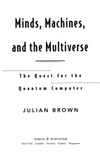The traditional and ubiquitous digital computer has changed the world by processing series of binary ones and zeroes...very fast. Like the sideshow juggler spinning plates on billiard cues, the classical computer moves fast enough to keep the plates from falling off. As computers become faster and faster, more and more plates are being added to more and more cues.
Imagine, then, a computer in which speed is increased not because it runs faster, but because it has a limitless army of different jugglers, one for each billiard cue. Imagine the quantum computer.
Julian Brown's record of the quest for the Holy Grail of computing — a computer that could, in theory, take seconds to perform calculations that would take today's fastest supercomputers longer than the age of the universe — is an extraordinary tale, populated by a remarkable cast of characters, including David Deutsch of Oxford University, who first announced the possibility of computation in the Alice-in-Wonderland world of quantum mechanics; Ed Fredkin, who developed a new kind of logic gate as a true step toward universal computation; and the legendary Richard Feynman, who reasoned from the inability to model quantum mechanics on a classical computer the logical inevitability of quantum computing.
For, in the fuzzily indeterminate world of the quantum, new computing power is born. Minds, Machines, and the Multiverse details the remarkable uses for quantum computing in code breaking, for quantum computers will be able to crack many of the leading methods of protecting secret information, while offering new unbreakable codes. Quantum computers will also be able to model nuclear and subatomic reactions; offer insights into nanotechnology, teleportation, and time travel; and perhaps change the way chemists and biotechnologists design drugs and study the molecules of life. Farthest along the trail blazed by these pioneers is the ability to visualize the multiple realities of the quantum world not as a mathematical abstraction, but as a real map to a world of multiple universes...a multiverse where every possible event — from a particular chess move to a comet striking the Earth — not only can happen, but does.
Incorporating lively explanations of ion trap gates, nuclear magnetic resonance computers, quantum dots, quantum algorithms, Fourier transforms, and puzzles of quantum physics, and illustrated with dozens of vivid diagrams, Minds, Machines, and the Multiverse is a mind-stretching look at the still-unbuilt but fascinating machines that, in the words of physicist Stanley Williams, "will reshape the face of science" and offer a new window into the secrets of an infinite number of potential universes.
Amazon.com Review Just how smart can computers get? Science journalist Julian Brown takes a hard look at the spooky world of quantum computation in Minds, Machines, and the Multiverse — and his report is optimistic. Based in large part on the groundbreaking work of David Deutsch, the book mostly sidesteps the shouting matches of the AI debate and instead explores the history of computation and quantum theory before turning to the exciting advances likely to come out of their merger. While some readers might cringe at the blithe dismissal of classical computing as a relic, Brown shows us why quantum computing is faster and more powerful, and is a good candidate for replacing its predecessor.
The author doesn't pull any mathematical punches, but injects enough humor and personalization into his writing to keep the book from crumbling to dust. Indeed, portraits of such luminaries as Deutsch and Feynman are more engaging than those found in some biographies and are enlightening on their own. But the real power and charm of Brown's prose lie in its straightforward explanation of the arcane details of the multiple-worlds theory, "qubits," and quantum logic in language any informed reader can understand. There are more questions than answers in Minds, Machines, and the Multiverse, but the questions are profoundly satisfying all by themselves. — Rob Lightner
 |
|
О проекте
|
|
О проекте


